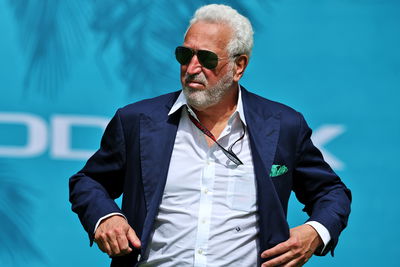F1 corruption case takes a new twist

The ongoing scandal and investigation into the circumstances surrounding the sale of F1's commercial rights five years ago has taken a fresh twist, it seems, with the German media now claiming that the shares in question were not undervalued as had been originally believed.
In January, German banker Gerhard Gribkowsky was jailed in Munich after being arrested on suspicion of receiving a $50 million backhander for undervaluing shares in SLEC - the sport's commercial rights-holder, and an organisation of which he was chairman, as well as chief risk officer for bank BayernLB - ahead of their 2006 sale to F1's current majority owner CVC Capital Partners.
With BayernLB controlling a 47.2 per cent stake in SLEC, Gribkowsky's brief was to ensure the best deal possible for the bank, but German prosecutors argue that far from doing so, he instead deliberately undervalued the shares - with wild accusations that the alleged bribe that encouraged him in his actions came from the sport's supremo Bernie Ecclestone.
However, Pitpass reveals that reports in credible and respected German magazine Der Spiegel - a publication with some 80 fact-checkers - now hint at a rather different version of events. The new suggestion is that there were other bidders - including Hong Kong conglomerate Hutchison Whampoa and private equity firm Clearbrook Capital - who were not willing to bid as much as CVC did for the shares. Hutchison Whampoa allegedly made an offer of $1 billion, and Clearbrook Capital $1.5 billion. The final sale figure to CVC was $1.7 billion.
As Pitpass points out, 'in any auction, the market value of a product is determined by what buyers are prepared to pay' - and therefore by extension, even if the Bayern shares had been worth more than they ultimately sold for, that would be irrelevant if nobody else had been prepared to outbid CVC. What's more, according to German newspaper Frankfurter Allgemeine Zeitung, Bayern sources claim the stake in the company sold 'clearly above its book value'.
To further cloud the issue, Pitpass reveals that the sale of its F1 shares 'decisively contributed to the positive result' of Bayern's valuation yield of EUR328 million in 2006 - and that the bank in actual fact did rather better out of the deal than at least one of the other banks that sold shares in SLEC to CVC.
Should the latest reports transpire to be closer to the truth when the case reaches trial, it remains to be seen what fate Formula One Management (FOM) chief executive Ecclestone has in-store for those publications that have dragged his name through the mud by seeking to implicate him in the furore, seemingly without any concrete evidence to substantiate their claims.
The British billionaire has already warned: "If the German newspapers write that I had something to do with the payments, which is absolute nonsense, I will take them to court."











